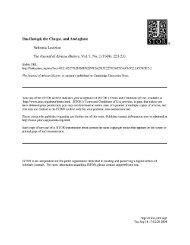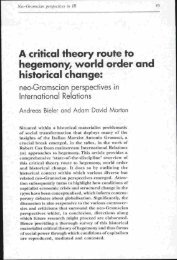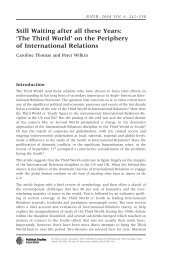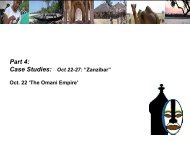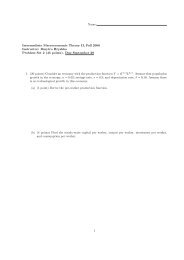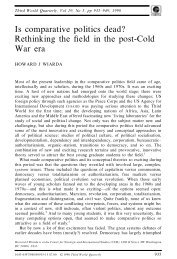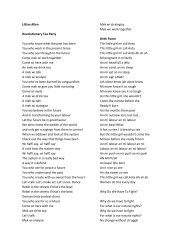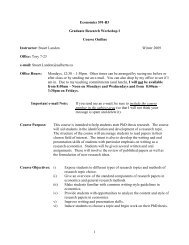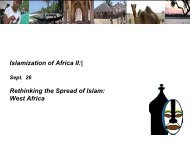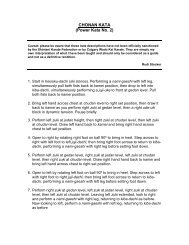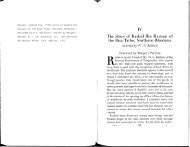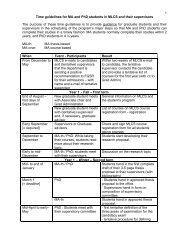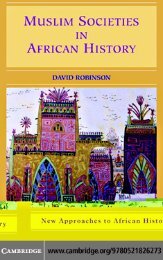personal memories revolutionary states and indian ocean migrations
personal memories revolutionary states and indian ocean migrations
personal memories revolutionary states and indian ocean migrations
Create successful ePaper yourself
Turn your PDF publications into a flip-book with our unique Google optimized e-Paper software.
His word, “I will praise the Word of God” (Psalms 56:10) that this<br />
indicates that the Word of God is a god in truth, <strong>and</strong> that this<br />
indicates that each of the Persons is a god in truth? 49<br />
Rather than finding it problematic that Jesus be called “son” (ibn) of God,<br />
Mundhiri heartily agrees with Kindi that ibn does not mean walad, because the<br />
Qur’an itself assures us of that; rather, ibn is used as a metaphor. But others have<br />
also been called sons of God, e.g. Adam in Luke 2:38. Does this mean that Adam<br />
also existed from eternity <strong>and</strong> is uncreated?” challenges Mundhiri. “Calling Jesus<br />
the son of God does not remove him from the attributes of creatures; it simply<br />
means that like Adam he was created without a father--<strong>and</strong> Adam also had no<br />
mother, which is even more amazing! Likewise in Luke 4:35, Jesus tells his disciples<br />
that if they love their enemies they will be sons of the most High. . . .” 50<br />
Naturally, Mundhiri is highly affronted by Kindi’s derogatory interpretation<br />
of Muhammad’s life:<br />
He even claims that he was a brig<strong>and</strong> who stole people’s<br />
possessions! Isn’t that one of the repugnant things that he<br />
prohibited, fighting those who did such acts <strong>and</strong> cutting off their<br />
h<strong>and</strong>s <strong>and</strong> feet because they did these things? . . . . You even allege<br />
that he went out to Yathrib to become a highwayman, <strong>and</strong> that<br />
this is why the people of Mecca expelled him from their city! By<br />
God, you have told a staggering lie <strong>and</strong> committed a grave sin . . . ,<br />
<strong>and</strong> the book of Jesus does not permit that. But this is no worse<br />
than the allegations you make against God’s book, the Torah, <strong>and</strong><br />
against Moses, on whom be peace, <strong>and</strong> against Abraham. 51<br />
As evidence that the Muslims did not enjoy God’s support, Kindi cites a<br />
Muslim raid on a Meccan caravan that was aborted because the Meccans<br />
outnumbered the Muslims more than three to one, “whereas you know that Gabriel<br />
in human shape rode on an ashen gray camel wearing a green mantle while Pharaoh<br />
<strong>and</strong> his host of 4,000 horses pursued the Israelites. . . . But your master has no<br />
such witness to bring”; likewise, the angels fought for Joshua at Jericho. Kindi<br />
suggested that if Muhammad were a man of God, an angel would have protected<br />
him from getting wounded at Uhud, as Elijah was protected from King Ahab,<br />
Daniel from the lions of Darius, <strong>and</strong> the three men from the furnace of<br />
Nebuchadnezzar. 52<br />
Mundhiri responds with reference to Numbers 13: Although God had said<br />
that he would cast fear of the Israelites into the hearts of the people so they could<br />
take their l<strong>and</strong>, Moses sent men to spy out the l<strong>and</strong>. “Did Moses not know God’s<br />
promise to him that he would have the l<strong>and</strong>? So why did he send spies? Is this a<br />
sign of fear or because of a lack of angelic support? Beware of criticizing the<br />
prophets <strong>and</strong> what they do, for if you criticize one of them, you criticize all of<br />
them!” Referring to the spies’ fearful report of the strong people of the l<strong>and</strong> <strong>and</strong> the<br />
people’s fear <strong>and</strong> doubts on hearing this report, Mundhiri asks, “Does this mean<br />
that Moses was not a prophet? Why didn’t angels come at that point to support <strong>and</strong><br />
encourage them <strong>and</strong> to fight on their behalf--<strong>and</strong> Joshua was among them, for<br />
whom the angels fought [at Jericho]!” 53<br />
Mundhiri defends Muhammad’s sternness with the Jews by comparing his<br />
actions with Peter’s harshness with a couple who had hidden some of the money<br />
gained from the sale of their l<strong>and</strong>, at a time when all the Christians were sharing all<br />
Vol. 5, Fall 2005, © 2005 The MIT Electronic Journal of Middle East Studies<br />
68



